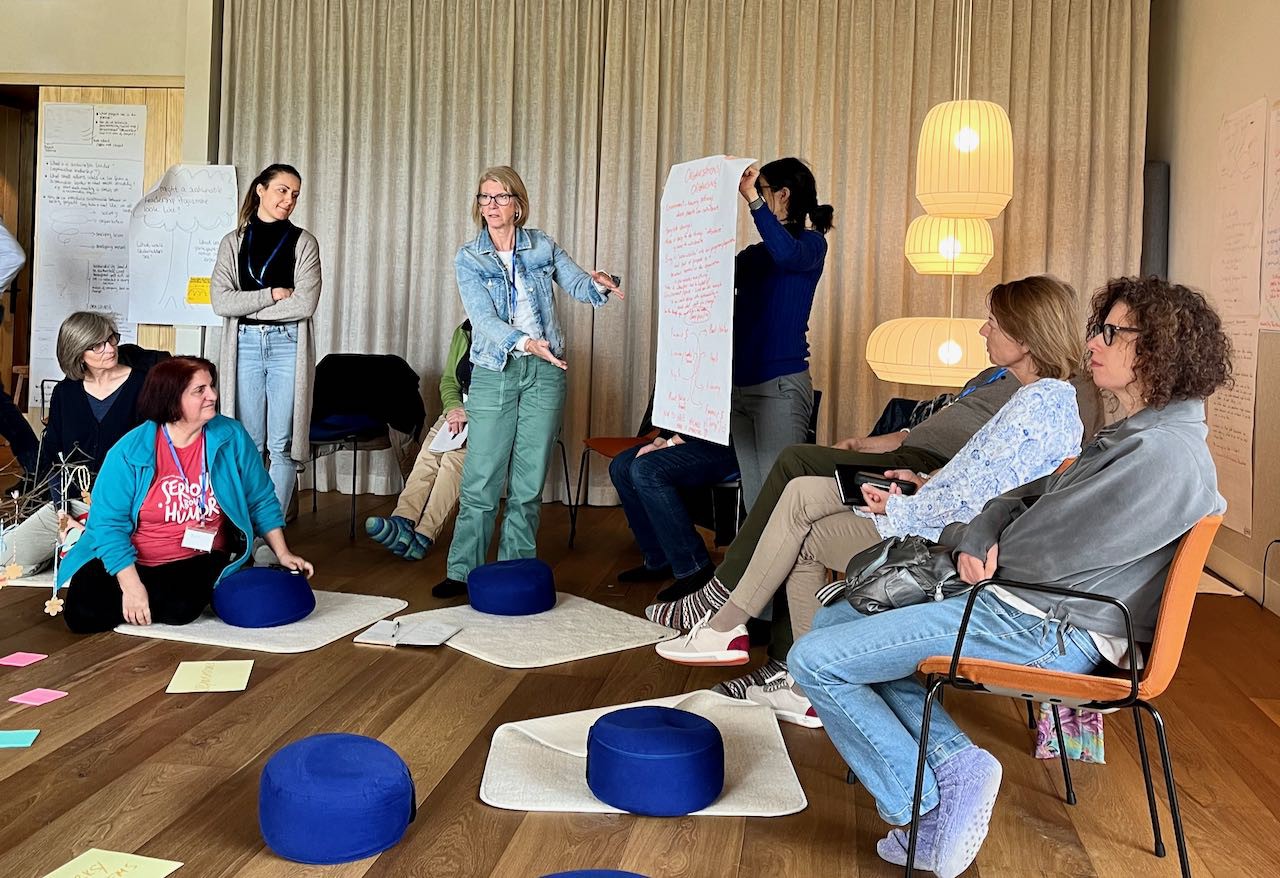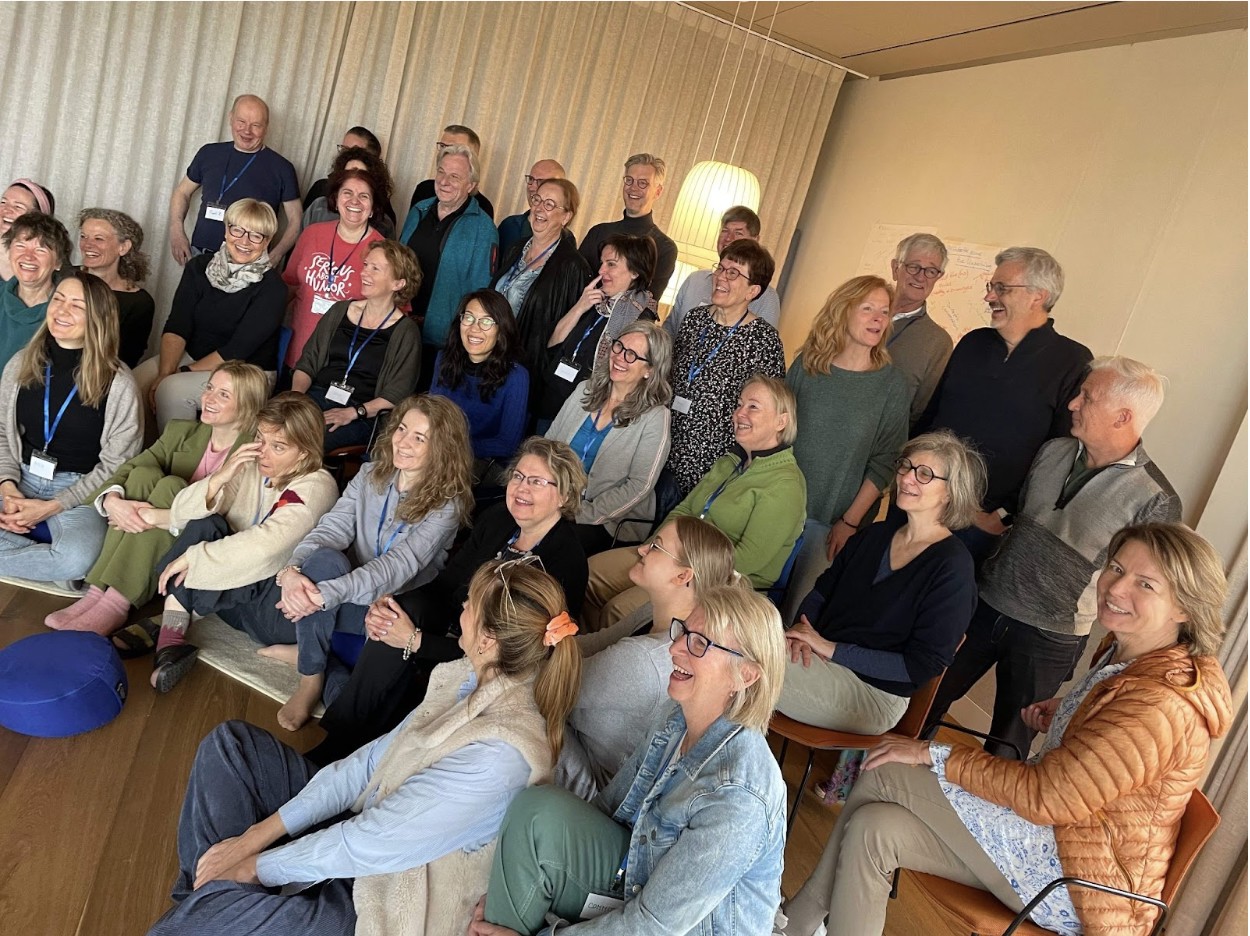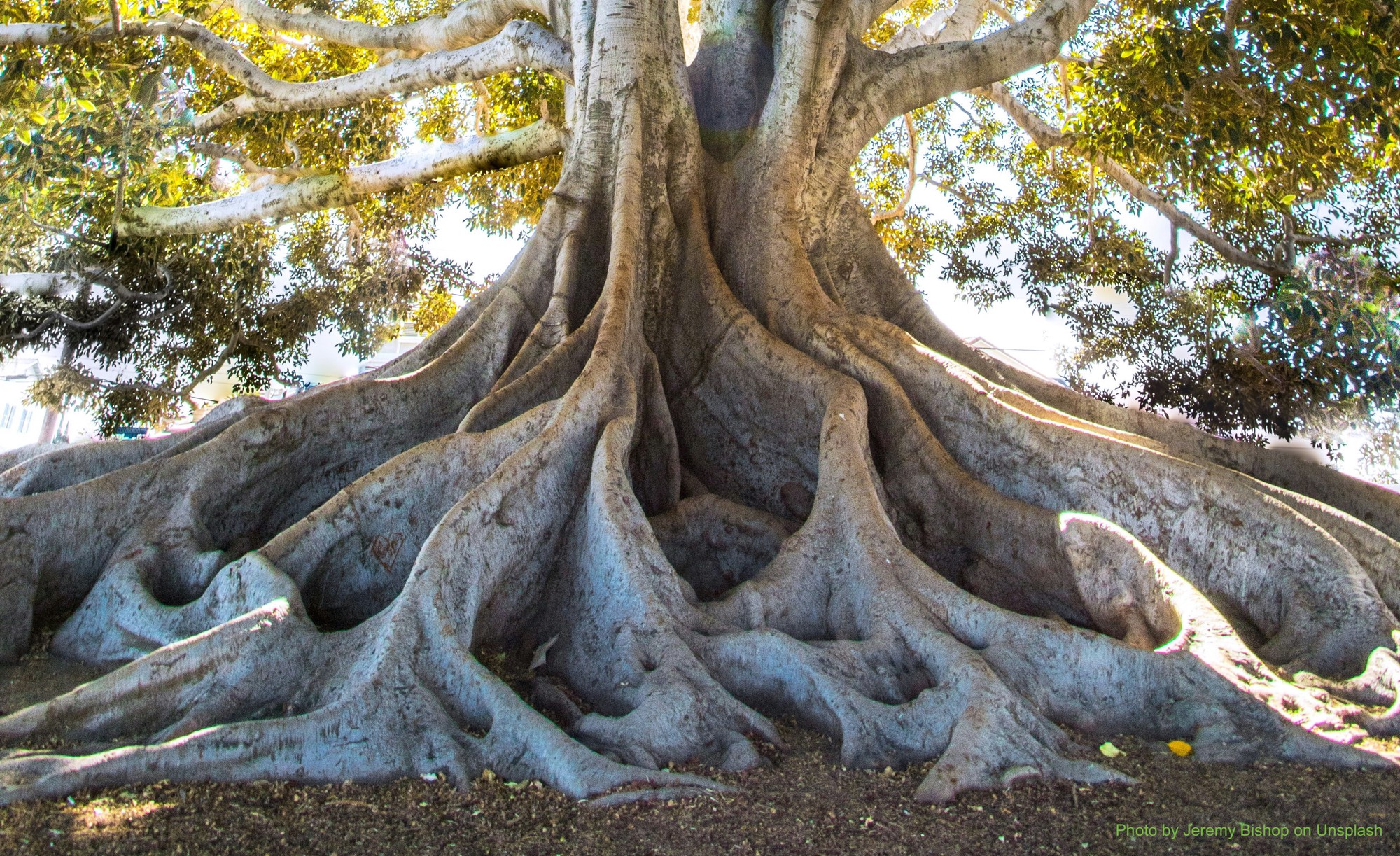Actions for Sustainability
For Individuals, Teams, Organisations, Ecosystems and Society
Dec 3, 2024
Introduction
A passionate group of solution-focused organisational practitioners came together for a two-day Unconference on how the Solution Focus (SF) approach could help create truly sustainable organisations. A powerful theme emerged: the need to make sustainability achievable for individuals and teams, empowering them to take meaningful action and providing hope that their efforts can make a real difference — whether within their organisation, networks, or society at large.
To dive deeper into this, at the end of the Unconference, the group split into teams based on interest to explore what actions can be taken at different levels:
- Individuals (Me)
- Teams
- Organisations / Organising
- Networks and Ecosystems
- Society
Each group’s insights were gathered, and with the help of AI technology, the Unconference Dossier editors created a comprehensive set of actions tailored to each level — ensuring a thorough and balanced reflection of participants’ ideas. Be prepared to read how YOU can contribute to a more sustainable world!
Take action now - Download the Unconference Dossier
As a first action, you can read all of the articles in our final Unconference dossier PDF. Download below.
How Might the Solution Focus Approach contribute to sustainable organisations?
Synopsis
The path to sustainability, whether for individuals, teams, or organisations, is about embracing positive change and taking purposeful action. Here’s how you can make a real difference:
For individuals, start by defining your vision—what’s your best hope for a more sustainable world? Whether it’s cutting waste, conserving resources, or advocating for eco-friendly choices, small steps add up. Practice mindfulness, enjoy the process, and foster a sense of gratitude as you take action. By sharing stories and working within your community, you inspire others to join the movement. Prioritize self-care to stay energized and accountable—your impact matters!
For teams, sustainability starts with conversations. Ask the right questions: how do our actions today align with a better tomorrow? Use long-term thinking, like the Seven Generations principle, to guide decisions that benefit future generations. Reuse, repurpose, and reduce waste at every opportunity, and celebrate progress, no matter how small. Simplicity is key—make sustainability accessible, and leverage your network to amplify your team’s impact.
For organisations, it’s about creating a culture where sustainability thrives. Design collaborative spaces, both physical and digital, that spark innovation and collective action. Make sustainability the easy choice; visible recycling bins, energy-efficient technologies, and eco-friendly practices can have a powerful ripple effect. Embed sustainability into the heart of your organization’s mission, and show how environmental stewardship is not just necessary but exciting and inspiring. Reorder priorities to focus on people, planet, and purpose over profit.
For ecosystems and networks Take action by connecting with existing initiatives and contributing your strengths. Collaborate with researchers for innovative solutions and foster meaningful conversations about sustainability in your networks. Share success stories to inspire others, offer a solution-focused approach to facilitate change, and engage your community through local initiatives. Be strategic with your resources to maximize impact and create lasting positive change.
For society
By embracing these principles, we can collectively drive meaningful change, create resilient communities, and build a future that’s both sustainable and fulfilling. Every action counts—and together, we can make a lasting impact for generations to come.
Actions generated

Actions for Individuals
Here is a rich tapestry of action for applying the principles of Solution Focus within sustainable organisations and your personal life. Here, we outline the actions and explore how you might implement them:
- Clarify your Best Hope: Understanding your best hope is foundational. This involves clarifying your goals and aspirations, personally and within the context of your organisation’s sustainability efforts. This clarity can guide decision-making and actions.
- Identify the difference you want to make: Identifying the difference you want to make provides direction and motivation. This could involve contributing to environmental sustainability, fostering community engagement, or promoting social justice within your organisation and beyond.
- Consciously Enjoy: Being mindful and present allows you to appreciate and learn from each experience, fostering a sense of gratitude and fulfilment. This mindset can enhance your overall well-being and resilience.
- Take Simple Actions: Small, consistent actions can lead to significant changes over time. Whether it’s reducing consumption, adopting eco-friendly habits, or advocating for sustainable practices, every action counts.
- Start from what is: Acknowledging the current reality without judgment allows for a more realistic assessment of challenges and opportunities. From this starting point, you can identify incremental steps towards desired outcomes.
- Foster community thinking: Embracing openness and collaboration fosters a sense of community and collective responsibility. Sharing experiences, stories, and successes can inspire others and create a ripple effect of positive change.
- Practice self-care: Prioritising self-care ensures you have the energy and resilience to contribute to sustainable initiatives effectively. Self-care includes physical, emotional, and mental well-being.
- Tell stories and co-create: Sharing personal stories and inviting others to do the same can build empathy, connection, and collective vision. Co-creation allows for diverse perspectives and creative solutions to emerge.
- Shift your mindset: Shifting from a crisis-oriented mindset to one focused on change and opportunity reframes challenges as potential catalysts for growth and innovation.
- Accept ownership and accountability: Owning your actions and their impact empowers you to drive meaningful change. Accountability ensures that people monitor that commitments are honoured and progress.
- Learn and grow: Integrating learning into daily work practices cultivates a culture of continuous improvement and innovation. The latter involves embracing feedback, experimenting with new approaches, and adapting to evolving circumstances.
- Adopt environmental consciousness: Adopting sustainable habits, such as reducing waste, conserving resources, and supporting local initiatives, demonstrates a commitment to environmental stewardship.
- Engage with the next generations: Fostering dialogue and collaboration with younger generations ensures the continuity of sustainable practices and values. Engaging involves mentoring, listening to their perspectives, and empowering them to lead. These actions encompass a holistic approach to integrating Solution-Focused practices into sustainable organisations, focusing on personal growth, community engagement, and environmental stewardship. Incorporating them into your personal and organisational practices can build more sustainable and resilient communities while nurturing your growth and well-being.
Actions for Teams
Over the next month, integrate sustainability into your conversations and decision-making processes using a solution-focused approach. Here’s how you can do it:
- Ask questions to bring sustainability into conversations: Start by asking questions that prompt discussions about sustainability in your interactions with colleagues, friends, and family. Focus on how current actions align with long-term environmental and social goals.
- Utilise the Seven Generations exercise: Incorporate the Seven Generations principle into your problem-solving and decision-making processes. Whenever faced with a choice or challenge, consider its potential impact on future generations and seek solutions that prioritise sustainability and long-term well-being.
- Practice the flow of reusability: Whenever assessing resources or materials, ask yourself and your team: “Can we reuse this?” Emphasise the importance of reusability and explore creative ways to repurpose items or resources to minimise waste and environmental impact.
- Evaluate societal and environmental impact: Before implementing any action or strategy, consider its broader impact on society and the environment. Encourage discussions around the potential consequences of your actions and strive to find solutions that promote positive outcomes for both people and the planet.
- Observe progress in small steps: Continually emphasise the importance of noticing progress in your sustainability efforts, no matter how small. Celebrate achievements and milestones to keep morale high and motivation strong.
- Emphasise simplicity in solution-focused practice: Keep the solution-focused approach simple and accessible. Encourage team members to apply it immediately to their daily work, emphasising its transformative power in changing perspectives and reducing complexity in problem-solving.
- Leverage your network: Use your network to connect teams with relevant resources and expertise in sustainability. Foster collaboration and knowledge-sharing to amplify your collective impact and accelerate progress towards sustainable goals.
By embracing these actions and challenges, you can foster a culture of sustainability and solution-focused thinking within your team or community, driving positive change for the present and future generations.
Actions for Organisations
Incorporating Solution Focus into sustainable organisations can significantly enhance their impact on society, particularly regarding environmental sustainability. Let’s explore how you can develop each of the actions you identified in the workshop:
- Create Collaborative Settings: Sustainable organisations can foster environments where collaboration thrives. Collaborative environments involve designing physical spaces that encourage interaction and idea exchange and implementing digital platforms for remote collaboration. Organisations can harness their members’ collective intelligence and creativity by facilitating collaboration to address environmental challenges effectively.
- Make Tangible Changes: Sustainable organisations should prioritise concrete actions that lead to measurable environmental improvements. Such actions could involve implementing energy-efficient technologies, reducing waste and carbon emissions, or investing in renewable energy sources. Tangible changes demonstrate a commitment to sustainability and inspire others to follow suit.
- Design Affordance and Ease of Action: Designing for “affordance” means creating environments or systems with easy and intuitive sustainable choices. Sustainable choices could include making recycling bins more visible and accessible, providing incentives for eco-friendly behaviours, or designing products with minimal environmental impact. Organisations can encourage widespread adoption by making sustainability the default option without imposing additional burdens on individuals.
- Embed Sustainability in programmes/organisations: Organisations must integrate Sustainable practices into their core purpose and operations. Integration involves aligning mission statements, goals, and incentives with sustainability objectives and incorporating environmental considerations into decision-making processes at all levels. Embedding sustainability into the organisational culture becomes a natural and integral part of how the organisation does things.
- Make Sustainability Attractive: Organisations should emphasise the benefits and appeal of eco-friendly behaviours to promote the widespread adoption of sustainable practices. Promotion involves showcasing success stories, highlighting the positive impact of sustainable initiatives, or leveraging social norms and peer influence to encourage participation. Organisations can motivate individuals to embrace change by making sustainability attractive and aspirational.
- Design with Sustainability in Mind: When designing products, services, or spaces, organisations should prioritise sustainability from the outset. Sustainable design could involve using eco-friendly materials, minimising resource consumption, or considering the long-term environmental impact of design choices. Organisations can create practical and environmentally responsible solutions by incorporating sustainability principles into the design process.
- Change the Order of Priorities: Reordering priorities from finance to planet/nature/animals, economy to people, and vice versa reflects a fundamental change in values and goals. Reprioritising requires leaders to rethink traditional business models and economic paradigms to prioritise environmental conservation, social equity, and long-term sustainability over short-term profits. By reordering priorities, organisations can realign their focus with broader societal and ecological imperatives, driving meaningful change at scale.
Actions for Ecosytems and Networks
These actions are potent for fostering sustainability within ecosystems, and they align well with the principles of the Solution Focus Approach. Let’s break down how each action contributes to creating more sustainable networks and ecosystems:
- Find people, places, organisations, and communities where something is already happening and connect; offer help, contribute: This action leverages existing initiatives and efforts, fostering collaboration and synergy rather than reinventing the wheel. By connecting with ongoing activities, you’re tapping into existing networks and resources, making the process more efficient and effective.
- Connect with researchers - Open Space, invite people and action: Engaging with researchers opens the door to evidence-based insights and innovative solutions. Open Space invites diverse perspectives and encourages collective action, fostering collaboration between researchers and practitioners to address sustainability challenges effectively.
- Offer Solution Focus (kindly) to well-meaning, passionate, active people, organisations, and communities to make change easier: Solution Focus provides a positive and empowering approach to problem-solving, focusing on strengths and solutions rather than dwelling on problems. By offering this approach to individuals and groups, you facilitate a mindset shift towards constructive action, making change more accessible and sustainable.
- Bring sustainability to the ecosystems you’re in, make connections, and open conversations: Integrating sustainability into various ecosystems creates a ripple effect, influencing attitudes and behaviours across different contexts. Opening conversations fosters awareness and engagement, driving collective action towards sustainability goals within diverse communities and organisations.
- Offer my learnings at this Unconference and to, e.g., the SF Association at home (spread the word): Sharing your learnings with relevant communities, such as the Solution Focus Association, amplifies the impact of your experiences. By spreading the word, you inspire others to adopt the principles of Solution Focus and contribute to building more sustainable organisations and societies.
- Enter my neighbourhood, e.g., “Let’s clean the streets,” as a door opener for more conversation and action: Local initiatives like neighbourhood clean-ups serve as catalysts for broader community engagement. They provide tangible opportunities for people to unite, spark conversations about sustainability, and inspire further collaborative efforts to improve the local environment and build social cohesion.
- Tell all the good stories you hear. Tell them everywhere, constantly; bring them up again and ask, “What’s the alternative here?”: Sharing success stories highlights positive examples of sustainability in action, inspiring others and reinforcing the importance of ongoing efforts. By prompting reflection on alternatives, you encourage critical thinking and innovation, driving continuous improvement in sustainability practices.
- Be an advocate and tell your story: As an advocate for sustainability, sharing your experiences and stories can be incredibly impactful. Personal narratives resonate with others on a deeper level, fostering empathy and motivation for change. Sharing your journey inspires others to take action and contribute to a more sustainable future.
- Be mindful to use and invest our personal resources well (people who respond, act, are receptive):
Being strategic and selective in allocating personal resources ensures maximum impact and sustainability. Prioritising engagement with individuals and groups who are responsive and receptive allows you to leverage resources effectively, fostering meaningful connections and driving positive change more efficiently.
These actions reflect a holistic and collaborative approach to sustainability, leveraging the principles of Solution Focus to create positive change within organisations, communities, and society. By fostering connections, promoting dialogue, and amplifying success stories, you contribute to building more sustainable and resilient ecosystems for the future.
Actions for Society
To explore the actions further in terms of society using Solution Focus to create a more sustainable society, let’s break down each action and consider how we might apply Solution Focus principles:
- Build local “climate councils” in cities > “climate atelier” for specific small actions to make first steps: Focus on small, achievable steps and celebrate successes. Encourage collaboration and inclusivity in decision-making within these councils. Rather than dwelling on problems, emphasise and build upon what is already working. Highlight the positive impact of small actions and their cumulative effect on the climate.
- Support events at the Unconference venue LaZ (e.g. invite the management team of TAD) and create a ripple effect (they invite the next non-profit organisation): Encourage the spread of positive actions through a ripple effect. Highlight the success stories of organisations like TAD and their impact on sustainability. Encourage others to follow suit by showcasing the benefits and outcomes of their actions. Focus on the potential for exponential growth in sustainable practices through networking and collaboration.
- Honour and translate ancestral and spiritual wisdom in one’s own daily life and walk the talk: Emphasise personal values and connections to inspire action. Highlight how ancestral and spiritual wisdom aligns with sustainable living principles. Encourage individuals to integrate these values into their daily lives and lead by example. Focus on the intrinsic motivation and fulfilment gained from living in alignment with one’s values.
- Advocate to policymakers that a rethinking of the system is necessary: Focus on constructive dialogue and finding common ground. Emphasise the benefits of a systemic shift towards sustainability for all stakeholders. Highlight success stories and evidence from other communities or regions with similar shifts. Encourage policymakers to envision a better future and identify achievable steps to move towards that future.
- Find the win-win and guide stakeholders in the transition: Facilitate collaborative problem-solving and negotiation. Identify common interests and goals among stakeholders. Encourage creative solutions that benefit all parties involved. Focus on building trust and fostering cooperation to successfully navigate the transition towards sustainability.
- Create “Islands of Sanity”: a balanced ecosystem that thinks long-term and strives for sustainability: Highlight examples of communities or organisations already embodying this concept. Encourage the replication and scaling of successful models. Focus on creating environments that support long-term thinking and sustainability. Celebrate the achievements of these “Islands of Sanity” and inspire others to follow suit.
- “Do what you can, where you are, with what you have”: Empower individuals to take action within their means and circumstances. Emphasise the importance of personal agency and initiative in driving change. Focus on practical, achievable steps individuals can take in their immediate environment. Celebrate every effort, no matter how small, towards creating a more sustainable society.
- Love and be an example: Emphasise the power of positive role modelling. Encourage individuals to embody values of love, empathy, and compassion in their interactions with others and the environment. Focus on the ripple effect of individual actions and the potential for inspiring others through personal example.
- Create a sustainable society of the future: Have sustainability councils with experts, policymakers and citizens: Solution Focus Approach: Foster inclusive decision-making processes that value diverse perspectives. Emphasise the importance of collaboration between experts, policymakers, and citizens in shaping sustainable policies and practices. Focus on creating environments that encourage innovation, transparency, and accountability in pursuit of sustainability goals.By applying Solution Focus principles to these actions, we can create a more sustainable society by focusing on strengths, collaboration, and positive change.
Overall conclusions from the Unconference

